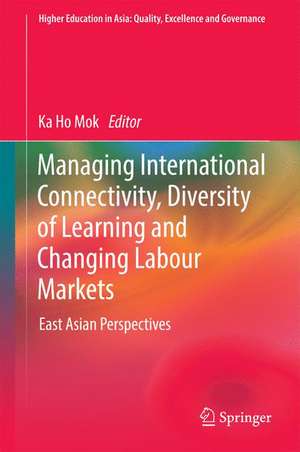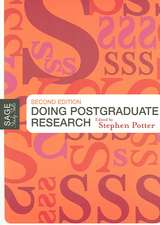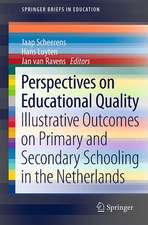Managing International Connectivity, Diversity of Learning and Changing Labour Markets: East Asian Perspectives: Higher Education in Asia: Quality, Excellence and Governance
Editat de Ka Ho Moken Limba Engleză Hardback – 18 aug 2016
| Toate formatele și edițiile | Preț | Express |
|---|---|---|
| Paperback (1) | 639.25 lei 6-8 săpt. | |
| Springer Nature Singapore – 12 iun 2018 | 639.25 lei 6-8 săpt. | |
| Hardback (1) | 645.47 lei 6-8 săpt. | |
| Springer Nature Singapore – 18 aug 2016 | 645.47 lei 6-8 săpt. |
Preț: 645.47 lei
Preț vechi: 759.37 lei
-15% Nou
Puncte Express: 968
Preț estimativ în valută:
123.50€ • 128.96$ • 101.99£
123.50€ • 128.96$ • 101.99£
Carte tipărită la comandă
Livrare economică 16-30 aprilie
Preluare comenzi: 021 569.72.76
Specificații
ISBN-13: 9789811017346
ISBN-10: 9811017344
Pagini: 284
Ilustrații: VIII, 261 p. 45 illus.
Dimensiuni: 155 x 235 x 16 mm
Greutate: 0.56 kg
Ediția:1st ed. 2017
Editura: Springer Nature Singapore
Colecția Springer
Seria Higher Education in Asia: Quality, Excellence and Governance
Locul publicării:Singapore, Singapore
ISBN-10: 9811017344
Pagini: 284
Ilustrații: VIII, 261 p. 45 illus.
Dimensiuni: 155 x 235 x 16 mm
Greutate: 0.56 kg
Ediția:1st ed. 2017
Editura: Springer Nature Singapore
Colecția Springer
Seria Higher Education in Asia: Quality, Excellence and Governance
Locul publicării:Singapore, Singapore
Cuprins
Chapter 1 Promoting International Connectivity and Seeking Global Competitiveness: Issues and Challenges.- Recent Trends and Development.- Chapter 2 Widely Recognized Problems, Controversial Solutions: Issues and Strategies for Higher Development in Asia.- Chapter 3 Internationalization and Transnationalization of Higher Education: A Review of the Asia Pacific Region.- Chapter 4 Qualification Recognition of Joint Degrees in Europe and Asia in the Era of Massification.- Chapter 5 Higher Education Activities in World Cities: A Spatial Study of Global Leadership and Connectivity.- Chapter 6 Global City Tokyo and the Lives of University Academics in Japan.- Chapter 7 Higher Education Industry in Hong Kong and Singapore: Reflections on a Decade of Expansion.- Chapter 8 Singapore as a Global Schoolhouse: A Critical Review.- International Connectivity and Managing Diversity in Student Learning.- Chapter 9 Getting Connected with the Global World: The Promotion of Internationalization in University Campuses in Hong Kong and China.- Chapter 10 Comparison of Student Experiences in the Era of Massification: Analysis of Student Data of Japan, Korea and the United States.- Chapter 11 Perceived Discrimination and Integration among New Arrivals from Mainland China: Implications for Higher Education Development for Hong Kong.- Managing Labour Market Changes and Employment.- Chapter 12 Massification of Higher Education and Labour Market: The Case of Taiwan.- Chapter 13 Massification of Higher Education: Challenges for Admissions and Graduate Employment in China.- Chapter 14 Teaching the Dragon? The Diffusion of European Union's Social and Employment Policies to China.
Notă biografică
Professor Ka Ho Mok is the Vice President and Chair Professor of Comparative Policy at Lingnan University, Hong Kong. Professor Mok has researched and published extensively in the fields of comparative education policy and governance, with particular focus on the Asia-Pacific region. He is also a core partner and researcher at the Centre for Global Higher Education, UCL Institute of Education, the world’s largest centre for international and global higher education research.
Textul de pe ultima copertă
This book examines how major Asian cities have enhanced their global competitiveness by transforming their higher education systems to equip their graduates with global competence. It primarily focuses on policy implications and urban governance, especially comparing how governments are responding to the growing challenges of international connectivity and are managing the diversity of populations resulting from an increasingly globalized world.
Caracteristici
Examines how major Asian cities have enhanced their global competitiveness by transforming higher education systems to equip students with global competence Compares how governments are responding to the challenges of international connectivity, and how they are managing the diversity of populations in a globalized world Discusses the policy implications and complexities for university governance in light of the privatization and massification that higher education is currently experiencing in Asia Includes supplementary material: sn.pub/extras




















